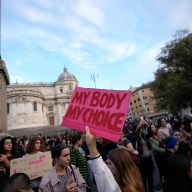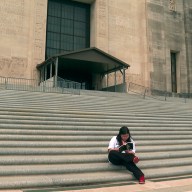 Diego Luna directed (but did not act in) the biopic “Cesar Chavez.”
Diego Luna directed (but did not act in) the biopic “Cesar Chavez.”
Credit: Getty Images
Mexican actor Diego Luna has been working in the industry since he was a boy, but he didn’t get America’s attention until “Y Tu Mama Tambien,” Alfonso Cuaron’s 2001 comic road trip. He has since teamed with his co-star, Gael Garcia Bernal, not only on other films (“Rudo y Cursi,” “Casa de Mi Padre”) but on a production company that makes films intended to appeal to audiences on both sides of the border. That includes “Cesar Chavez,” a biopic on the labor union organizer (played by Michael Pena) that Luna directed.
What is your own history with Cesar Chavez?
I didn’t know much about him. In fact, it was the shame I felt [laughs] that made me want to do this film. I remember the funeral was when was a teenager. I remember the image of thousands of farm workers in the streets in California. I remember the wooden box he was in. It had no paint, no nothing. He was sending a message of equality even when he died — no luxury at all. I remember thinking, “Who is that guy?” But that curiosity did not make me go deeper. When I started traveling in the states and working in California, I’d see avenues called “Chavez,” murals about him in East L.A., schools named after him.
What changed that?
My company opened an office in California, and we started looking for stories that would appeal to both sides of the border, that would allow us to work in the States but talk about who we are and where we come from. This sounded like a perfect one, because it’s a story about a Mexican-American. He was born in Arizona, but he was very connected to my country.
Much of what he rebelled against is still a problem.
It’s about how a completely ignored community found a way to connect with consumers. That’s why we focus on the boycott and those ten years of his life, because what they did was ahead of their time. Instead of going straight to the industry and falling into violence, they talked directly to the consumer. They made the consumer understand their story mattered. It’s about that responsibility that it is to be a consumer today. When you buy a product, you’re a part of something.
Actually, the film often looks timeless. There’s not a lot of period stereotypes.
I wanted to avoid stereotypes in general. When I started researching, I realized how far Chavez was from the cliche of the Mexican-American stereotype — with tequila in his hand and a mariachi sombrero eating a chorizo burrito. This man was a vegetarian. He read Gandhi. His movement was nonviolent. They keep his office as he had it, and they allowed me to come. I promised not to break anything. I was shocked by the music he would listen to. It was all jazz — Charlie Parker, Miles Davis. No one would imagine the leader of farm workers, this Mexican-American, was a fan of John Coltrane. Well, he was.
This is the second fiction feature you’ve directed, and you’ve made shorts and documentaries. What made you want to transition from acting in the first place?
I’ve been acting since I was 6. I think I was just getting bored with it. And I was starting to become a pain in the ass for directors. I think it’s very dangerous when an actor tries to impose his point of view when you’re working on a film. I like film when it celebrates the point of view of one person, and that’s the director. As an actor you are a tool for someone else’s point of view. When you’re trying to impose your point of view, you can be difficult. I have the feeling I was starting to be a little like that. I realized I had to tell my own story.
This is a bigger production than the other films you’ve made, in that it’s about a real person’s life and spans years. What were some of the difficulties?
Everything was difficult. We would try to get financing from the studios. That was a big shock. Everyone was like, “This is an amazing idea, we’re glad you’re doing it, but we’re not going to join.” I heard things like, “Can you make it more sexy?” Someone literally said that. They said like, “Can you have an A-list actor doing it, like Antonio Banderas or Javier Bardem?” I was like, “Have you seen Cesar Chavez?” It’s almost like asking me, “Can you make it a non-Latino?”
You rarely find films about this community, about the Latino experience. The other day we were in a meeting in Chicago, and someone in the foundation said this was the first film about a Latino that is not from the entertainment business. It’s ridiculous. This community is so important in this country. This is a country that celebrates every heroic story in cinema. They grab stories that are not heroic and make them heroic in films. The last film I remember being a biographical film was “Selena.” There’s no other hit that has made it into the mainstream. It’s pathetic! Our goal is to show that there’s a market for these films, that there’s an audience that wants to be fed, that wants to be represented. But it’s not easy to prove something, you know? It will be easier for the next one if we succeed.
Follow Matt Prigge on Twitter @mattprigge
















